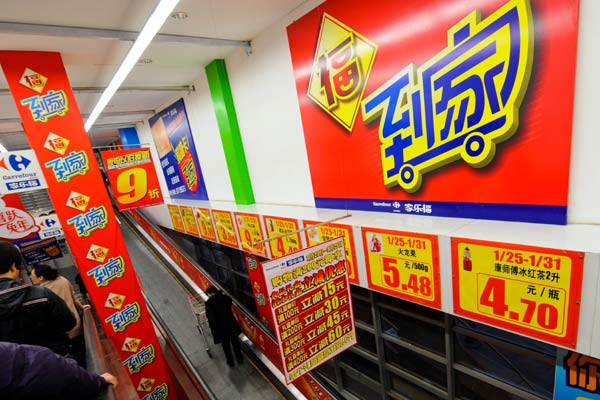

|
 |
Historically, larger supermarket operators in China have located their stores about 5 to 15 km from the centers of first-tier cities. Over the past 10 years, the strategy has paid off, but the the market has become saturated.
About 59 percent of consumers in first-tier cities surveyed by UBS AG said they have three or more supermarkets close by.
But consumer loyalty in first-tier cities is the lowest of all: 56 percent of consumers frequently shop at two or more stores. So the proliferation of new outlets serving the largest cities is slowing quickly.
In light of the change in consumer habits, UBS conducted a survey in 16 cities to determine which tiers hold the most potential for supermarket operators. The survey covered 1,277 consumers, 40 percent male and 60 percent female.
Eighty percent of the interviews were conducted in city centers and the balance away from the centers.
The survey analyzed the number of supermarkets available to shoppers, the criteria adopted by consumers to choose a supermarket and the proportion of consumers who might switch to online shopping over the next two to three years.
The survey also compared prices of 75 items at five online or physical supermarket platforms to determine whether operators have room to lower prices.
During the urbanization process, UBS believes that most people will move to a new category that it calls "Tier-1.5 cities". These are areas 15-40 km outside major cities. They're also set to be the most attractive markets for supermarket operators.
They will have faster population growth, lower store density and higher consumer loyalty. They will also have consumers with strong purchasing power and those who value product selection over price.
Tier-1.5 cities will also be important for online operators. UBS expects rapid penetration of e-commerce in the supermarket segment over the next two to three years. The bank found that 49 percent of consumers across all city tiers already purchase supermarket goods online.
Of those who haven't done so, 58 percent said they may purchase supermarket goods online in the next two to three years. UBS believes that conversion to online shopping is likely to be faster in Tier-1.5 and fourth-tier cities.
It expects consumers in Tier-1.5 cities to use online platforms for wider choice and those in fourth-tier cities to seek lower prices.
Price competition in first-tier cities is set to intensify, UBS found, and its analysis shows there is no current price leader. With one global supermarket operator recently announcing a new strategy of offering the lowest prices on 500 core items within a 2 km area, competitors are expected to react aggressively, lowering profitability for all operators.
The author is a UBS China consumer research analyst.
 Model with modified Audi A5
Model with modified Audi A5
 Model with German luxury cars
Model with German luxury cars
 Getting in the mood
Getting in the mood
 Models at Mercedes pavilion at 2013 Auto Guangzhou
Models at Mercedes pavilion at 2013 Auto Guangzhou
 Buick Riviera concept car at 2013 Auto Guangzhou
Buick Riviera concept car at 2013 Auto Guangzhou
 FAW-VW all-new Golf at Guangzhou auto show
FAW-VW all-new Golf at Guangzhou auto show
 VW donates more than 5k child safety seats
VW donates more than 5k child safety seats
 Honda models at 2013 Guangzhou auto show
Honda models at 2013 Guangzhou auto show